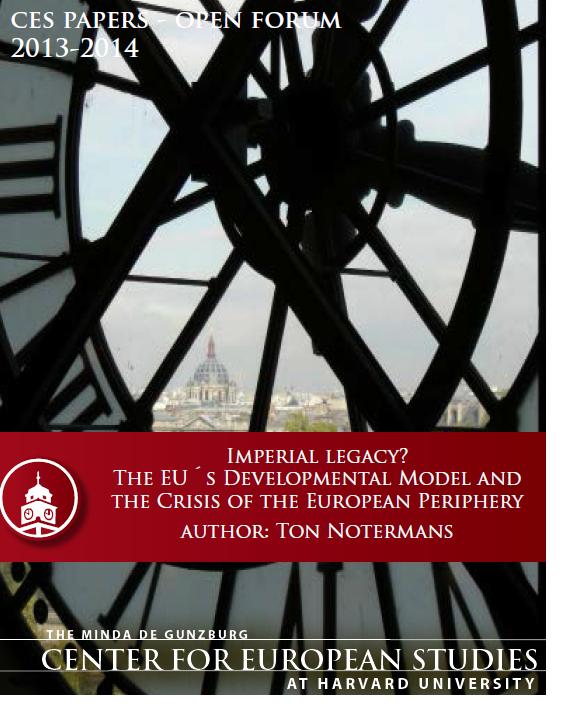Benz, Arthur, Corcaci, Andreas, Doser, Jan Wolfgang, (2016), “Unravelling multilevel administration. Patterns and dynamics of administrative co-ordination in European governance”, Journal of European Public Policy, 20 Αpril The concept of multilevel governance adds a crucial dimension to the debate about political decision-making by conceptualizing policy co-ordination across territorial levels of government. While research on European governance has generated a differentiated analytical concept to understand the varieties of co-ordination, it has not clarified the …Read More
The electoral consequences of the financial and economic crisis in Europe
Hernández, Enrique, Kriesi, Hanspeter, (2016), “The electoral consequences of the financial and economic crisis in Europe”, European Journal of Political Research, Μay The electoral consequences of the Great Recession are analysed in this article by combining insights from economic voting theories and the literature on party system change. Taking cues from these two theoretical perspectives, the impact of the Great Recession on the stability and change of Western, Central and Eastern European …Read More
Pressured budgets and the European Commission: towards a more centralized EU budget administration?
Goetz, Klaus H., Patz, Ronny, (2016), “Pressured budgets and the European Commission: towards a more centralized EU budget administration?”, Journal of European Public Policy, 22 Αpril Similar to many international public administrations (IPAs), the European Commission has been delegated a range of tasks related to budgeting. The Commission administration enjoys a high degree of autonomy in routine annual budget procedures leading to the adoption of the draft annual EU budgets; it also has a …Read More
Crisis, learning and policy change in the European Union
Kamkhaji, Jonathan C., Radaelli, Claudio M., (2016), “Crisis, learning and policy change in the European Union”, Journal of European Public Policy, 20 Αpril What is the causal relationship between crisis, learning and change? How did causality unfold in the key years of 2009–2010 when the European Union had to face the most formidable attacks to the single currency and responded with substantial reforms of the euro area? We question the conventional identification of …Read More
Imperial legacy? The EU´s Developmental Model and the Crisis of the European Periphery
Notermans,Ton, (2014), “Imperial legacy? The EU´s Developmental Model and the Crisis of the European Periphery”, CES Papers Open Forum #19, The high hopes for rapid convergence of Eastern and Southern EU member states are increasingly being disappointed. With the onset of the Eurocrisis convergence has given way to divergence in the southern members, and many Eastern members have made little headway in closing the development gap. The EU´s performance compares …Read More
Public finances in Europe: fortifying EU economic governance in the shadow of the crisis
Laffan, Brigid, Schlosser, Pierre, (2016), “Public finances in Europe: fortifying EU economic governance in the shadow of the crisis”, Journal of European Integration, 8 March The Eurozone crisis resulted in a decisive change of Europe’s fiscal surveillance regime that brought the question of public finance oversight sharply into focus. The Stability and Growth Pact, the fiscal cornerstone of Europe’s Economic and Monetary Union (EMU), was fortified, expanded and supplemented by the so-called …Read More
Institutions and Growth in Europe
Masuch, Klaus, Moshammer, Edmund, Pierluigi, Beatrice (2016), “Institutions and Growth in Europe”, CEPS Working Document No. 421, 14 April This paper provides empirical evidence in support of the view that the quality of institutions is an important determinant of long-term growth of European countries. When also taking into account the initial level of GDP per capita and government debt, cross-country institutional differences can explain to a great extent the relative long-term GDP …Read More
The Refugee Surge in Europe : Economic Challenges
Aiyar, Shekhar, Barkbu, Bergljot, Batini, Nicoletta, Berger, Helge, Detragiache, Enrica, Dizioli, Allan, Ebeke, Christian, Lin, Huidan, Kaltani, Linda, Sosa, Sebastian, Spilimbergo, Antonio, Topalova, Petia, (2016), “The Refugee Surge in Europe : Economic Challenges”, IMF Staff Discussion Note SDN/16/02, January The dislocation of large parts of the population in Syria and other conflict zones is, first and foremost, a humanitarian catastrophe with important ramifications across many countries in the Middle East, Europe, and beyond. This note focuses on one facet of this complex issue, the economic aspects of the surge in asylum seekers …Read More
Can only Eurosceptics oppose austerity? How divisions over integration have replaced the left/right divide in the European Parliament
Van der Veer, Harmen, Otjes, Simon, (2016), “Can only Eurosceptics oppose austerity? How divisions over integration have replaced the left/right divide in the European Parliament”, LSE blogs/Europpblog, 12 April How do economic platforms interact with support for European integration?Harmen van der Veer and Simon Otjes write that the dynamics within the European Parliament have undergone a shift since the beginning of the Eurozone crisis. Whereas in previous periods the key divide in the …Read More
The EU, a Fair-Weather Ship Between Scylla and Charybdis
Hänska, Max, (2016), “The EU, a Fair-Weather Ship Between Scylla and Charybdis”, LSE blogs/EuroCrisis, 5 April The EU faces debilitation by multiple crises: economic malaise and high unemployment, an influx of refugee and mounting security concerns. They all lay bare that resilience was not build into the EU’s architecture, it lacks the institutional capacities to respond to external shocks. Either its members create the capacities needed to respond resolutely to such shocks, …Read More





